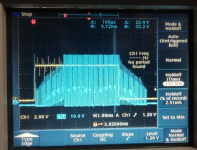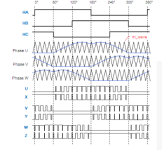Hi all,
Two years ago I built my first electric scooter with 48V 360W hub motor with 350W KT sine wave controller, works fine, no issues. Then I got a new frame and built the second one with 48V 500W motor with KT 500W sine wave controller. Now I got problems.
I have motor connected to a controller with their original wires and connectors and a thumb trigger. I have Aim-TTI CPX400SP power supply with 48V output and current limit is set to MAX. This power supply should give around 400Ws.
I push slowly the thumb trigger, motor spin up and I slowly push further, motor accelerates but at some point it starts cogging, like going out of sync and power supply current limit triggers. Motor spins in the air with no load. Motor runs smooth and quiet until cogging starts. Motor is sensored.
I switched the thumb trigger from my other scooter, tried again, same happens.
I then switched the controller from my other scooter, same happens.
I did not dare to connect it to a battery because these issues.
Is there anything that KT controllers require like matching the motor to the controller via programming or tuning ? Didn't do anything with my first scooter, worked fine from the start.
Hope you can give me a hint what should I try next, I have oscilloscope and other equipment in hand.
This is the motor:
Controller:
 www.greenbikekit.com
Thumb trigger:
www.greenbikekit.com
Thumb trigger:
Thanks.
Two years ago I built my first electric scooter with 48V 360W hub motor with 350W KT sine wave controller, works fine, no issues. Then I got a new frame and built the second one with 48V 500W motor with KT 500W sine wave controller. Now I got problems.
I have motor connected to a controller with their original wires and connectors and a thumb trigger. I have Aim-TTI CPX400SP power supply with 48V output and current limit is set to MAX. This power supply should give around 400Ws.
I push slowly the thumb trigger, motor spin up and I slowly push further, motor accelerates but at some point it starts cogging, like going out of sync and power supply current limit triggers. Motor spins in the air with no load. Motor runs smooth and quiet until cogging starts. Motor is sensored.
I switched the thumb trigger from my other scooter, tried again, same happens.
I then switched the controller from my other scooter, same happens.
I did not dare to connect it to a battery because these issues.
Is there anything that KT controllers require like matching the motor to the controller via programming or tuning ? Didn't do anything with my first scooter, worked fine from the start.
Hope you can give me a hint what should I try next, I have oscilloscope and other equipment in hand.
This is the motor:
Controller:
KT/Kunteng motor controller 36V/48V500W compatible with LCD meter-Greenbikekit.com BBS, ebike batteries, Bafang M620, Bafang M600, Bafang M500, Bafang M510, KT controller with display-GreenBikeKit.com
KT/kunteng motor controller for KT LCD meter.
Thanks.
Last edited:



